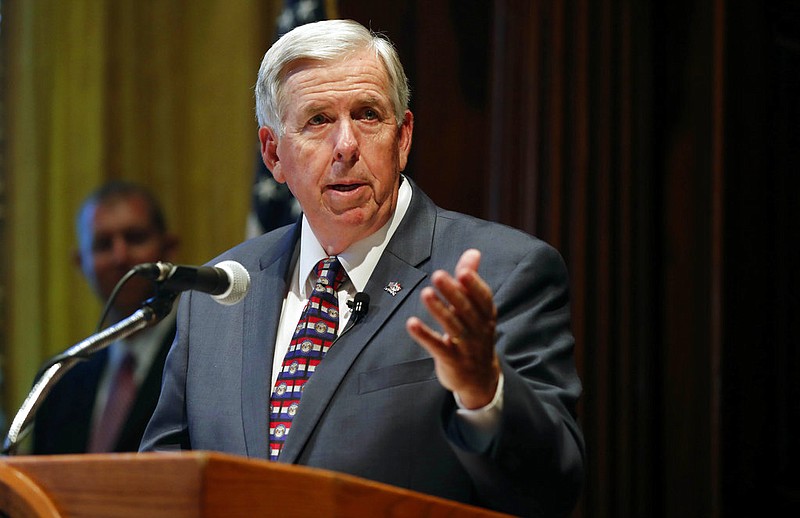LINN, Mo. - Reducing crime and improving the state's Corrections system are important parts of Gov. Mike Parson's main goals of improving the state's workforce and infrastructure, he said Friday.
Addressing the more than 150 people attending the Missouri State Forum on Public Safety, meeting at State Technical College, Parson said: "That crime rate affects people all over this state - it has an effect on every Missourian.
"It has an effect on when businesses come to this state or not - and that means the economy in this state (and) opportunity for the people we're talking about."
Corrections Director Anne Precythe noted, when she came to Missouri in early 2017, one of the department's legislative requests was for more beds in the Corrections system.
But, she noted: "I knew that asking for additional beds would go against the flow" of the national trend for reducing prison populations - at least partly by trying to make sure that inmates who leave prison don't return.
Parson said: "The reform aspects of our prisons will play a huge factor when it comes to workforce development in the state of Missouri. One of the things we know we have to do is, we've got to figure out how do we take people who are incarcerated, and how do we put them on the right path when they're released?
"How do we get them to perform, to get them into the workforce? And how do we make sure that they don't come back?
"Those are the obstacles that we've had, for years."
And those were the main issues discussed during Friday's day-long meeting in Linn.
Before he became a state lawmaker in 2011, Parson served a dozen years as Polk County's sheriff.
"When I was sheriff, the majority of the people who came through that county jail, I will tell you, were not bad people. (They just had made) terrible choices," he told the Public Safety Forum. "But the simple thing was, we took them through the sentencing process and sent them to prison, to get them out of our jails."
Faced with all the questions about whether Missouri is helping those who are in prison or making it easier for them to repeat crimes once they're back on the streets, the governor said Friday: "I have no interest in building any more prisons in the state while I'm governor. None.
"What I do have an interest in is, how do I make sure - while they are where they are - how do I help them to get educated?
"How do I help them get ready for the workforce?"
Even though he spoke nearly two hours before the governor, Lt. Gov. Mike Kehoe offered an answer to some of Parson's questions.
"We absolutely have to have the appropriate law enforcement authorities working together, we have to have the appropriate mental health people working together," Kehoe said.
Noting his own history as a car dealer, Kehoe said there are many similarities between running a successful government and a successful small business.
"All of those people work together to make sure that car goes to that customer and that customer is happy," he explained. "And, if any one of them mess their job up, the customer is unhappy.
"Like in any small business, if the customer is unhappy, the business has troubles. You've got to make sure that team works together and communicates with each other."
And many government operations are the same.
For example, when it comes to criminal justice, "We have to make sure the communities have adequate victims' services," Kehoe said. "Do the sheriff and police chief get along?
"Is the Department of Corrections responsive to the sheriff?
"Do local police have the resources they need to do their jobs?
"Are appropriate mental health and behavioral health resources available?
"And then, is there anything that we're doing in the state Capitol that's messing up your job?"
Kehoe said Friday's conference wouldn't provide all the answers to those questions.
But he hoped the participants would help get the discussions rolling.
New Public Safety Director Sandra Karsten's been on the job since the end of August - but came to the post after a three-decade-long career with the Missouri Highway Patrol.
"We see that the resources that are available to law enforcement are varied throughout the state," she told the News Tribune at the end of the conference. "Certainly, in some of the communities in the rural areas, we need to do a better job of making sure that crisis intervention training is available to law enforcement."
Warrensburg Police Chief Rich Lockhart served in Kansas City before moving to Johnson County and noted it's "interesting to see both sides - (from) the large force and the small city."
Particularly working in a college town, the home of the University of Central Missouri, and with Whiteman Air Force Base nearby, Lockhart told the forum it's been important to form partnerships with others who are in law enforcement.
Precythe, who helped organize Friday's forum, told the News Tribune: "I'm hoping the team from Corrections realized that we're part of a very big picture.
"And that what we do in Corrections is every bit as important as what judges do in the courtroom, law enforcement does in the community, providers do in the office, and that we are an integral part in public safety and keeping our streets safer."

